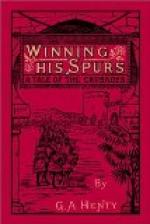Lady Margaret was rejoiced at the news that the time for escape had come, for the perpetual clash of war, the rattling of arrows, the ponderous thud of heavy stones, caused a din very alarming to a young girl; and although the room in which she sat, looking into the inner court of the castle, was not exposed to missiles, she trembled at the thought that brave men were being killed, and that at any moment a shot might strike Cuthbert, and so leave her without a friend or protector.
Content with having destroyed the door, the assailants made no further effort that evening, but prepared in the morning to attack it, pull down the stones filled behind it, and force their way into the keep. There was, with the exception of the main entrance, but one means of exit, a small postern door behind the castle, and throughout the siege a strong body of troops had been posted here, to prevent the garrison making a sortie.
Feeling secure therefore that upon the following day his enemies would fall into his power, Sir Rudolph retired to rest.
An hour before midnight the garrison assembled in the hall. The table was removed, and Cuthbert having pressed the spring, which was at a distance from the stone and could not be discovered without a knowledge of its existence, the stone turned aside by means of a counterpoise, and a flight of steps was seen. Torches had been prepared. Cnut and a chosen band went first; Cuthbert followed, with Lady Margaret and her attendants; and the rest of the archers brought up the rear, a trusty man being left in charge at last with orders to swing back the stone into its place, having first hauled the table over the spot, so that their means of escape should be unknown.
The passage was long and dreary, the walls were damp with wet, and the massive doors so swollen by moisture that it was with the greatest difficulty they could be opened. At last, however, they emerged into the little friary in the wood. It was deserted, the priest who usually dwelt there having fled when the siege began. The stone which there, as in the castle, concealed the exit, was carefully closed, and the party then emerged into the open air. Here Cuthbert bade adieu to his comrades. Cnut had very anxiously begged to be allowed to accompany him and share his fortunes, and Cuthbert had promised him that if at any time he should again take up arms in England, he would summon him to his side, but that at present as he knew not whither his steps would be turned, it would be better that he should be unattended. The archers had all agreed to scatter far and wide through the country, many of them proceeding to Nottingham and joining the bands in the forest of Sherwood.




